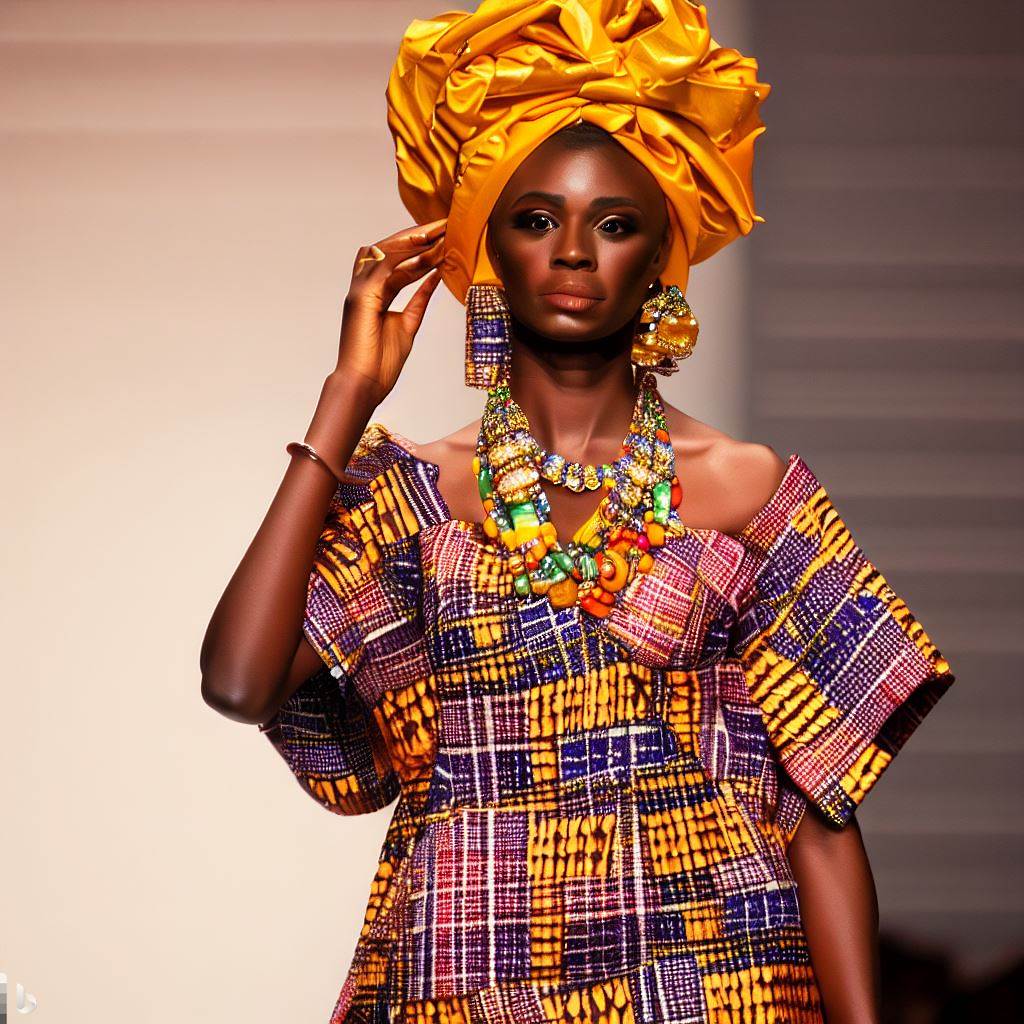Introduction
In Nigeria, education is crucial for aspiring fashion designers as it equips them with essential skills and knowledge.
The fashion industry in Nigeria has experienced significant growth and potential in recent years.
With a population of over 200 million, there is a large market for fashion designers and their creations.
Additionally, Nigeria has a rich cultural heritage, which serves as a source of inspiration for fashion designers.
Education helps aspiring fashion designers to understand the foundations of fashion design, including garment construction, fabric selection, and fashion illustration.
It also allows them to develop their creativity and unique design aesthetic. Furthermore, education provides aspiring fashion designers with business and marketing skills essential for success in the industry.
In today’s competitive fashion landscape, having a solid educational foundation can give aspiring fashion designers a competitive edge.
Education also allows designers to stay updated with the latest trends, technologies, and techniques in the fashion industry.
Overall, education plays a vital role in shaping the future of fashion design in Nigeria by nurturing talented individuals and helping them realize their potential.
Read: Exploring Fashion Designer Salaries in Nigeria 2024
Education Options for Fashion Designers in Nigeria
When it comes to pursuing a career in the fashion industry, education plays a crucial role in honing one’s skills and acquiring the necessary knowledge.
In Nigeria, aspiring fashion designers have a variety of education options to choose from.
Let’s explore some of them:
Formal Education Options
- Fashion Design Schools: There are several fashion design schools in Nigeria that offer comprehensive programs.
- Universities: Some universities in Nigeria provide fashion-related programs, such as fashion design and textile sciences.
- Polytechnics: Polytechnics also offer diploma and certificate courses in fashion design and related disciplines.
- Vocational Institutes: These institutes provide short-term courses for individuals looking to gain specific skills in fashion design.
- Online Courses: With the rise of technology, many fashion design courses are now offered online, providing flexibility for learning.
The Benefits of Pursuing a Formal Education in Fashion Design
- Technical Skills: Formal education equips fashion designers with the technical skills required to excel in the industry.
- Creative Development: Education provides a platform for fashion designers to explore their creativity and enhance their design abilities.
- Industry Knowledge: Through formal education, designers gain valuable insights into the fashion industry, market trends, and consumer behavior.
- Networking Opportunities: Fashion design schools and universities offer opportunities to connect with industry professionals, potential mentors, and like-minded peers.
- Access to Resources: Educational institutions provide access to libraries, workshops, and specialized equipment necessary for fashion design projects.
- Industry Recognition: Having a formal education in fashion design enhances one’s credibility and increases the chances of recognition in the industry.
- Business Skills: Alongside core design courses, educational programs often include business and entrepreneurship modules, equipping designers with the necessary skills to run their own fashion businesses.
- Professional Development: Formal education focuses not only on design skills but also on professional development, including presentation skills, teamwork, and time management.
- Industry Exposure: Many educational programs offer internships or industry placements, giving students hands-on experience and exposure to real-world fashion scenarios.
- Global Perspective: Some fashion design schools collaborate with international institutions, providing exposure to global fashion trends and fostering a global perspective.
It is worth noting that while formal education plays a significant role, some successful fashion designers in Nigeria have achieved recognition through self-taught skills and practical experience.
Passion, determination, and a strong work ethic are equally important in the fashion industry.
However, for aspiring fashion designers who have the opportunity and resources, pursuing a formal education in fashion design offers numerous benefits and can greatly enhance their chances of success in this competitive field.
Whether attending fashion design schools, universities, or online courses, the knowledge, skills, and industry exposure gained through formal education provide a strong foundation for aspiring fashion designers in Nigeria.
Read: Building a Foley Studio in Nigeria: Costs and Considerations
Curriculum and Courses
When pursuing a fashion design program in Nigeria, you can expect to explore a variety of key subjects and courses that are essential for your education in this field.
The curriculum is carefully designed to provide a comprehensive understanding of fashion design principles, textile technology, garment construction, pattern cutting, and fashion illustration.
Here are some of the important aspects:
Design principles
- Understanding design principles is crucial for aspiring fashion designers in Nigeria.
- Courses in design principles teach students about color theory, balance, proportion, and aesthetics.
- These courses help students develop their creative thinking and visual communication skills.
Textile technology
- Textile technology is an essential component of a fashion design curriculum in Nigeria.
- Students learn about different types of fabrics, their properties, and manufacturing techniques.
- Understanding textile technology allows fashion designers to choose appropriate fabrics for their designs.
Garment construction
- Garment construction courses focus on teaching students the practical skills needed to bring their designs to life.
- Students learn about sewing techniques, pattern making, draping, and fitting garments.
- These courses provide hands-on experience in creating well-constructed and perfectly fitting garments.
Pattern cutting
- Pattern cutting is a fundamental skill that every fashion designer needs to master.
- Courses in pattern cutting teach students how to create patterns for different garment styles.
- Students learn about measurements, drafting patterns, and adjusting them for different body types.
Fashion illustration
- Fashion illustration allows designers to communicate their ideas visually.
- Courses in fashion illustration teach students how to draw figures, fabric textures, and clothing designs.
- These courses help students develop their own unique illustration style and bring their designs to life.
A well-rounded curriculum covering these key subjects ensures that fashion design students in Nigeria receive a comprehensive education that prepares them for the industry.
By learning design principles, textile technology, garment construction, pattern cutting, and fashion illustration, students gain a solid foundation in both the creative and technical aspects of fashion design.
Moreover, the practical hands-on experience gained through coursework and projects allows students to develop their skills and build a portfolio of work that showcases their abilities.
This portfolio can then be used to showcase their talent to potential employers or clients upon graduation.
Therefore, the curriculum and courses offered in fashion design programs in Nigeria are designed to provide students with the necessary knowledge and skills to succeed in the industry.
By understanding design principles, textile technology, garment construction, pattern cutting, and fashion illustration, aspiring fashion designers in Nigeria can build a strong foundation for a successful career in the dynamic world of fashion.
Read: How to Start a Fashion Design Business in Nigeria
Practical Training and Internships
Practical training and internships play a significant role in the education of fashion designers in Nigeria.
They offer valuable real-world industry exposure and enhance practical skills.
Importance of Experiential Learning
- Experiential learning provides hands-on experience that cannot be gained solely through theoretical education.
- It allows fashion designers to apply their knowledge in a practical setting and learn from real-world challenges.
- Internships provide an opportunity to work alongside professionals and gain valuable mentorship.
- By working on actual fashion projects, designers learn to navigate industry demands and deadlines.
- Through experiential learning, designers understand the importance of attention to detail and quality craftsmanship.
Real-World Industry Exposure
- Practical training and internships expose fashion designers to the realities of the fashion industry in Nigeria.
- They provide insights into industry trends, consumer preferences, and market dynamics.
- Designers learn about production processes, sourcing materials, and managing supply chains.
- They gain exposure to the business side of fashion, including marketing, branding, and retail strategies.
- Working with established fashion houses or designers allows for networking opportunities and industry connections.
Enhancing Practical Skills
- Practical training and internships allow designers to hone their technical skills and acquire new ones.
- They learn patternmaking, garment construction, draping techniques, and fabric manipulation.
- Hands-on experience enables designers to develop a keen eye for color, texture, and proportions.
- By working with different materials, designers broaden their understanding of fabric characteristics and properties.
- Internships also provide a platform to experiment with innovative design techniques and technologies.
Industry Requirement for Employment
- In the competitive fashion industry, practical training and internships are often prerequisites for employment.
- Employers value practical experience, as it demonstrates a designer’s ability to execute their ideas.
- Having interned or trained with renowned fashion houses adds credibility to a designer’s portfolio.
- Many job postings require a minimum number of internship hours or practical experience.
- Employers seek designers who can seamlessly transition from academia to the professional fashion world.
Building Professional Confidence
- Practical training and internships provide a platform for fashion designers to build their confidence.
- By successfully completing industry projects, designers gain a sense of accomplishment and self-assurance.
- Realizing their potential, designers develop the confidence to pursue their creative visions.
- Feedback from industry professionals helps designers refine their skills and validate their abilities.
- Confidence gained from practical training and internships translates into successful fashion careers.
Therefore, practical training and internships are vital components of the education of fashion designers in Nigeria.
They offer experiential learning, industry exposure, skill enhancement, and build confidence for future employment in the competitive fashion industry.
Read: The Evolution of Foley Artistry in Nigerian Film Industry
Indigenous Fashion and Cultural Influences
In the vibrant world of Nigerian fashion, there is a unique aspect that sets it apart from other fashion industries around the globe.
This distinctiveness lies in the incorporation of traditional and cultural elements into contemporary designs.
Exploring Nigerian Fashion’s Unique Aspect
Nigerian fashion designers have mastered the art of blending tradition and modernity, creating stunning pieces that celebrate the country’s rich cultural heritage.
By infusing indigenous elements into their designs, they are able to showcase the beauty, diversity, and uniqueness that Nigeria has to offer.
From traditional fabrics like Ankara and Aso Oke to incorporating traditional patterns and motifs in contemporary silhouettes, Nigerian fashion designers have successfully bridged the gap between tradition and innovation.
This fusion results in exquisite garments that showcase the country’s cultural richness.
The Importance of Understanding Nigerian Culture, Heritage, and Indigenous Artisans
For aspiring fashion designers in Nigeria, a deep understanding of the country’s culture, heritage, and indigenous artisans is crucial.
By immersing themselves in this knowledge, designers can create designs that pay homage to their roots while also pushing the boundaries of creativity.
Understanding Nigerian culture allows designers to grasp the significance of traditional textiles, patterns, and symbols.
It enables them to appreciate the cultural context behind these elements and use them in a respectful and meaningful way.
Furthermore, by collaborating with indigenous artisans, fashion designers have the opportunity to promote and preserve the craftsmanship and skills passed down through generations.
These collaborations create a symbiotic relationship where designers gain inspiration and unique craftsmanship, while artisans receive recognition and economic empowerment.
By embracing Nigerian culture, heritage, and indigenous artisans, fashion education becomes a transformative experience.
Students not only learn technical skills but also gain a profound understanding of the country’s rich cultural tapestry.
Benefits of Incorporating Indigenous Fashion in Education
Integrating indigenous fashion into education offers numerous benefits.
Firstly, it fosters cultural pride and identity among students, as they learn to appreciate and celebrate their own heritage.
Secondly, it encourages innovation and creativity. By incorporating traditional elements, designers are pushed to think outside the box and explore new possibilities while staying connected to their cultural roots.
Additionally, incorporating indigenous fashion widens the global impact of Nigerian fashion.
Designers who understand and respect their own culture have the potential to create designs that resonate with people from different backgrounds, fostering cross-cultural dialogue and appreciation.
Nigeria’s fashion industry thrives on its ability to merge tradition and modernity seamlessly.
By incorporating indigenous fashion and cultural influences, Nigerian designers create garments that reflect the country’s rich heritage and celebrate its diverse culture.
Understanding and appreciating Nigerian culture, heritage, and indigenous artisans are vital components of fashion education in Nigeria.
By embracing these elements, aspiring designers gain a deeper sense of identity, creativity, and a global perspective on the power of cultural diversity in fashion.
Read: Building Networks: An Essential for TV Reporters in Nigeria

Industry connections and networking
Networking and establishing industry connections hold immense value in the fashion industry.
Educational institutions play a crucial role in providing ample networking opportunities for aspiring fashion designers.
Through industry partnerships and collaborations, students can gain firsthand experience and insights into the fashion world.
Networking events organized by educational institutions give students a chance to interact with professionals and industry veterans.
These events create a platform for students to showcase their talent, exchange ideas, and build relationships with influential individuals.
The role of educational institutions in providing networking opportunities, industry partnerships, and mentorship programs
Mentorship programs offered by educational institutions connect students with experienced professionals who provide guidance and support.
Having a mentor in the fashion industry can open doors to invaluable advice, knowledge, and potential job opportunities.
Students can learn from the experiences and challenges faced by their mentors, which can significantly enhance their own skills.
Industry connections and networking enable fashion designers to gain exposure and expand their professional networks.
Through networking, designers can meet potential employers, collaborators, investors, and clients who can help boost their careers.
Attending industry events, such as fashion weeks and trade shows, gives designers the opportunity to showcase their work to a wider audience.
Building relationships with influential individuals in the industry can lead to collaborations and endorsements.
Networking also allows fashion designers to stay updated with the latest trends, technologies, and market insights.
By connecting with professionals, designers gain access to exclusive industry information and resources.
Through networking, designers can learn about job openings, internships, and freelance opportunities that may not be advertised publicly.
Education for fashion designers in Nigeria should focus on providing students with ample networking opportunities and industry connections.
Collaborations with fashion brands, professionals, and organizations can enrich the learning experience for aspiring designers.
Mentorship programs should be encouraged to provide guidance and support to students as they navigate their careers in the fashion industry.
An emphasis on networking and industry connections will enable Nigerian fashion designers to thrive in a competitive global market.
Overall, education for fashion designers in Nigeria should not only focus on technical skills but also on establishing industry connections and networking.
By fostering collaborations and mentorship programs, educational institutions can prepare students for successful careers in the fashion industry.
Entrepreneurship and business skills
In the fast-paced and competitive world of fashion, having a creative eye and innovative designs is simply not enough.
Fashion designers in Nigeria, like anywhere else, need to develop strong business skills and entrepreneurial knowledge in order to succeed in the industry.
The significance of acquiring business skills and entrepreneurship knowledge in the fashion industry
- Increased competitiveness: Acquiring business skills and entrepreneurship knowledge gives fashion designers a competitive edge in the market.
- Understanding market trends: Business skills help designers analyze market trends and consumer behavior, ensuring their designs align with market demands.
- Effective brand management: With business skills, designers can effectively manage their brand identity, positioning, and marketing strategies.
- Financial management: Business skills enable designers to effectively manage finances, ensure profitability, and make informed business decisions.
- Networking opportunities: Through entrepreneurship knowledge, designers can build valuable connections and partnerships within the fashion industry.
- Adaptability and innovation: Fashion is a highly dynamic industry, and business skills empower designers to adapt to changing trends and innovate their designs.
- Long-term sustainability: Acquiring business skills enables designers to create sustainable business models that can withstand market fluctuations.
The inclusion of courses on fashion marketing, retail management, and business planning in fashion education programs
Fashion education programs in Nigeria should include courses that focus on fashion marketing, retail management, and business planning to equip designers with the necessary skills for a successful career.
- Fashion marketing: Courses on fashion marketing teach designers how to create effective marketing strategies to promote their brand and reach their target audience.
- Retail management: Courses on retail management provide designers with knowledge on how to efficiently manage their own fashion stores or work effectively with retail partners.
- Business planning: Courses on business planning teach designers how to develop comprehensive business plans to guide their operations and achieve their goals.
- Financial management: Understanding financial management helps designers effectively manage budgets, pricing, and cash flow in their fashion businesses.
- Entrepreneurship principles: Courses should also cover entrepreneurship principles, teaching designers how to identify opportunities, manage risks, and build a strong business foundation.
- Market research: Courses on market research provide designers with the skills to gather and analyze data, allowing them to make informed decisions about their target market.
- Branding and advertising: Courses should also cover branding strategies and advertising techniques to help fashion designers create a strong and enticing brand image.
In short, acquiring business skills and entrepreneurship knowledge is crucial for fashion designers in Nigeria to thrive in the competitive industry.
Fashion education programs should include courses on fashion marketing, retail management, business planning, and other relevant topics to equip designers with the necessary skills for success.
Access to resources and support
The availability of resources such as libraries, design studios, and equipment is crucial for fashion designers in Nigeria.
Access to these resources plays a significant role in the education and development of aspiring fashion designers.
Libraries provide access to a wide range of books, magazines, and research materials for designers to expand their knowledge.
Design studios offer a creative and collaborative space where designers can bring their ideas to life.
Publish Your Professional Profile, Business or Brand
Showcase your expertise, gain trust, and boost visibility instantly on Professions.ng.
Publish NowHaving access to professional-grade equipment allows fashion designers to hone their skills and create high-quality garments.
The importance of educational institutions facilitating access to resources and providing ongoing support for students
Educational institutions play a vital role in facilitating access to these resources and providing ongoing support for students.
They should ensure that their libraries are well-stocked with relevant fashion books, magazines, and resources.
Design studios should be equipped with the latest technology and tools to facilitate hands-on learning and experimentation.
Furthermore, educational institutions should offer workshops and seminars on using equipment and technologies effectively.
Providing ongoing support to students is equally important as access to resources.
Mentorship programs can connect students with industry professionals who can offer guidance and advice.
These mentors can provide valuable insights into the fashion industry and help students navigate their career paths.
Financial assistance programs should also be available to students who may not have the means to afford expensive equipment or materials.
Such support ensures that talented individuals do not miss out on educational opportunities due to financial constraints.
Collaboration and partnership give access to resources.
Collaboration with industry partners is another way educational institutions can provide support to fashion designers.
Partnerships can give students access to internships, workshops, and other opportunities to gain real-world experience.
Additionally, educational institutions should organize exhibitions and fashion shows to showcase students’ work and create networking opportunities.
These events can help designers build connections with industry professionals and potential clients.
Finally, it is essential for educational institutions to keep up with the evolving needs of the fashion industry.
They should regularly update their resources and equipment to reflect the current trends and technologies in the field.
By doing so, they ensure that their students are well-prepared and equipped to succeed in their careers as fashion designers.
On a final note, access to resources and ongoing support are crucial for the education of fashion designers in Nigeria.
Educational institutions must take the initiative to provide these resources, such as libraries and design studios, and facilitate ongoing support, including mentorship programs and partnerships with industry professionals.
By doing so, they empower aspiring fashion designers to reach their full potential and contribute to the growth of the Nigerian fashion industry.
Challenges and Opportunities in the Nigerian Fashion Education System
Challenges faced by aspiring fashion designers in Nigeria
Aspiring fashion designers in Nigeria face a number of challenges when it comes to their education and training.
These challenges include limited infrastructure and funding, which can hinder their growth and progress in the industry.
One of the main challenges faced by aspiring fashion designers in Nigeria is the lack of adequate infrastructure.
Many fashion design schools and institutions in the country lack proper facilities and equipment, making it difficult for students to acquire practical skills and experience.
This limitation can hinder their ability to fully develop their creative abilities and reach their full potential as fashion designers.
In addition to limited infrastructure, funding is another significant challenge faced by aspiring fashion designers in Nigeria.
The lack of financial support or access to loans makes it difficult for students to afford tuition fees, purchase materials, or invest in equipment.
This financial barrier often limits opportunities for talented individuals who may not have the means to pursue their fashion education.
The potential opportunities for growth and improvement in the Nigerian fashion education system
Despite these challenges, there are also opportunities for growth and improvement in the Nigerian fashion education system.
Firstly, collaborations and partnerships between fashion design schools and established fashion industry professionals can provide aspiring designers with valuable mentorship and practical experience.
By tapping into the expertise and network of professionals, students can gain insights into the realities of the fashion industry and develop necessary skills to succeed.
Furthermore, increased access to funding opportunities, either through government initiatives or private sector involvement, can help address the financial challenges faced by aspiring fashion designers in Nigeria.
Scholarships, grants, and loans specifically tailored for fashion students can open doors for those who otherwise would not have been able to afford a quality education.
In addition, the incorporation of technology into the fashion education system can provide aspiring designers with new opportunities for learning and skill development.
Online courses, virtual workshops, and digital resources can bridge the gap in limited infrastructure and reach a wider audience of students across the country.
Lastly, the creation of supportive and collaborative communities within the fashion education system can foster creativity, innovation, and networking opportunities for aspiring fashion designers.
Fashion design forums, workshops, and events can connect students with peers, industry professionals, and potential employers, creating a supportive ecosystem for growth.
In the end, aspiring fashion designers in Nigeria face challenges such as limited infrastructure and funding.
However, there are opportunities for growth and improvement in the Nigerian fashion education system, including collaborations with industry professionals, increased access to funding, integration of technology, and the creation of supportive communities.
By addressing these challenges and leveraging these opportunities, aspiring fashion designers can receive the education and support they need to thrive in the Nigerian fashion industry.
Discover More: The Role of Design in Nigeria’s Thriving Entertainment Industry
Conclusion
The blog post discussed the importance of education for fashion designers in Nigeria.
It highlighted the need for formal training to acquire technical skills, knowledge of the industry, and business acumen.
The post also emphasized the availability of resources such as fashion schools and online courses.
Aspiring fashion designers in Nigeria are encouraged to pursue education and take advantage of these resources to maximize their chances of success in the industry.
By equipping themselves with the necessary skills and knowledge, they can stand out in a highly competitive field and thrive in the fashion business.
Education is the foundation for a successful career in fashion design, and by investing in their education, aspiring designers can unlock their potential and make significant contributions to the Nigerian fashion industry.




